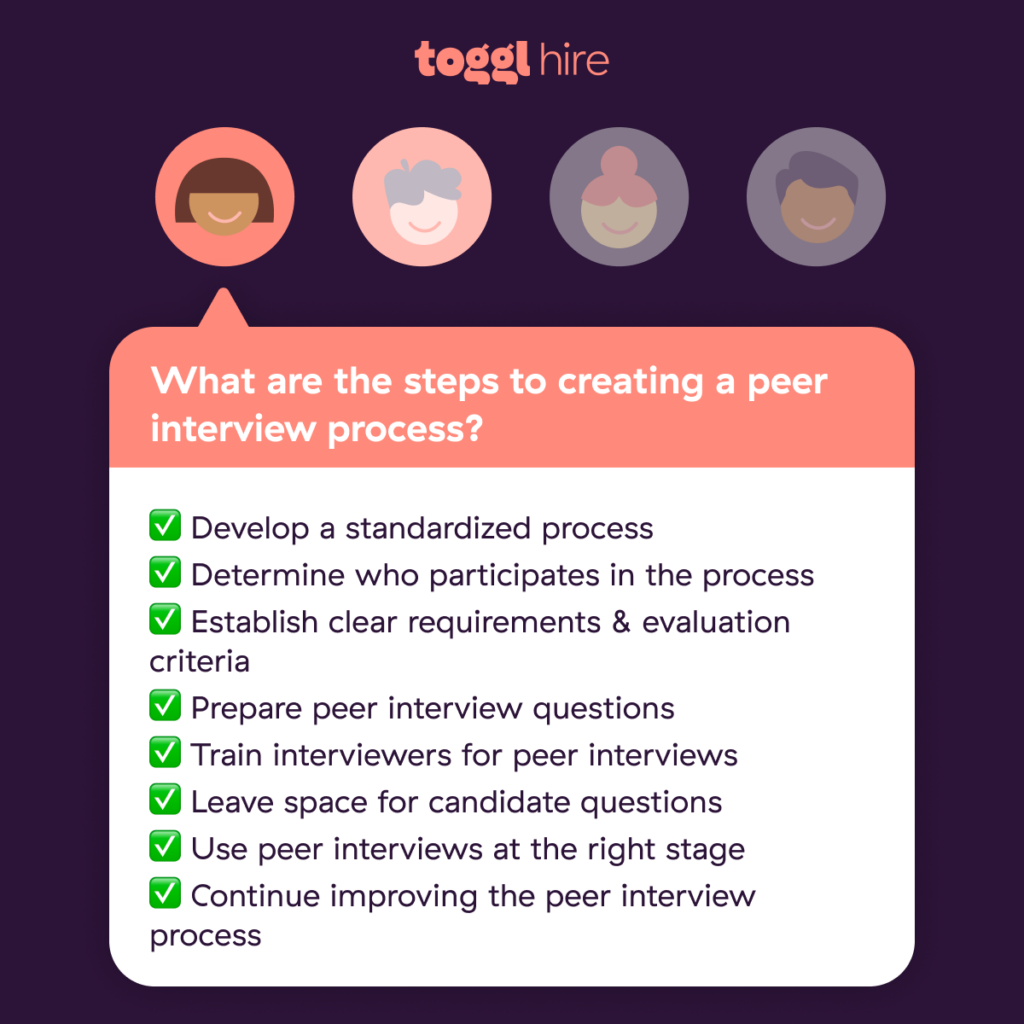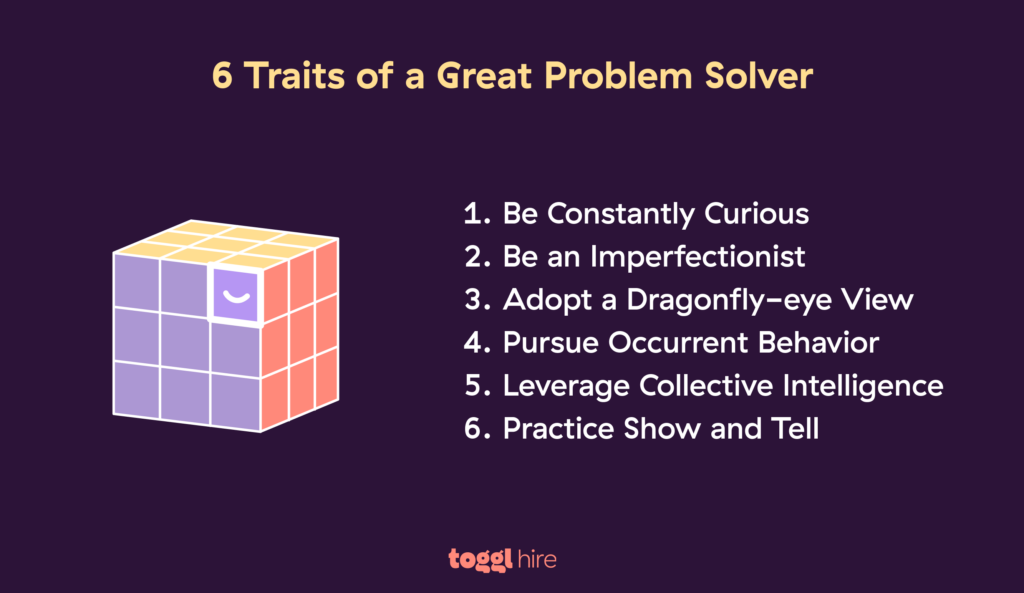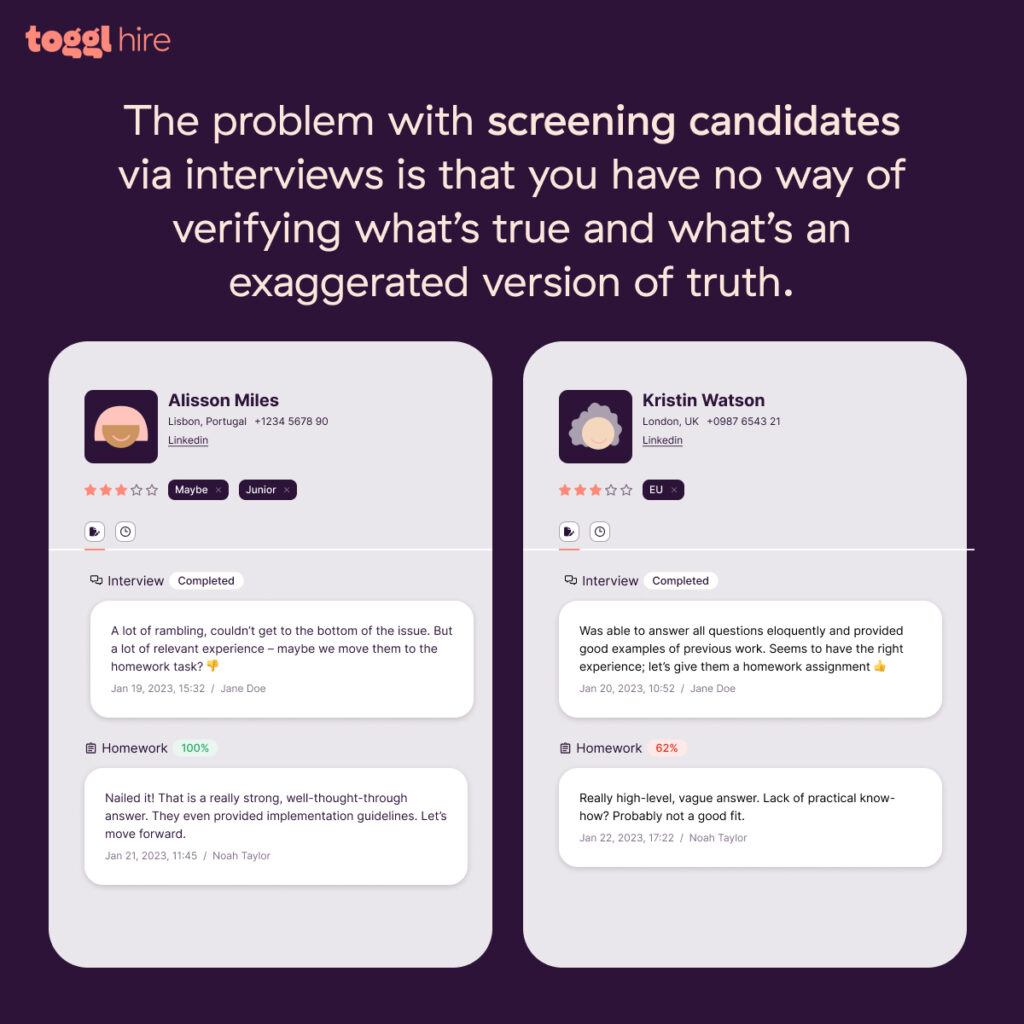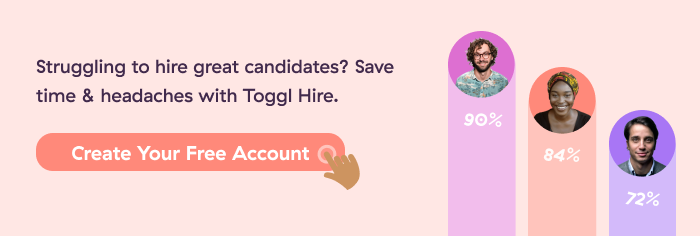Peer interviews offer a deeper, more holistic picture of a candidate who might soon join the team.
However, they’re not only beneficial for hiring managers. Instead, you can think of peer interviews (like most interviews) as a two-way street: not only do they reveal the perfect fit for your team’s culture and dynamics, but they also amp up a candidate’s enthusiasm about becoming part of your crew.
To make these sessions productive, however, a lot of it comes down to which questions to ask in a peer interview. Here, peer interviewers play an important role in managing these discussions to ensure the team focus remains on the most relevant peer interview questions.
TL;DR — Key Takeaways
Peer interviews are a screening tool that helps candidates and their future peers establish whether they’ll work well together (before making a job offer).
Is there a right way to conduct peer interviews? Well, if you utilize a standardized process and select the right peer interviewers, you’ll be off to a good start.
A well-prepped peer interviewer team will understand the duties and responsibilities of the job role. We share two other tips to help interviewers prepare and ensure success.
How do you evaluate a candidate’s answers? Using a candidate scorecard can be very helpful. We share 6 extra pointers to help you assess peer interview answers.
Need ideas on what peer interview questions to ask? We share examples of specific questions that cover areas such as teamwork, motivation, and communication. Check them out below.
Remember that before the peer interview stage, you need to know if the candidate has the relevant skills that will complement the team. Toggl Hire’s skills platform solves that with role-specific skills tests and questions created by subject matter experts.

What’s a peer interview?
Peer interviews are a recruitment technique where team members (who will eventually work with the new hire) interview candidates. Hiring managers use these interviews as a way for the team to assess the candidate’s skills, culture fit, and often technical suitability for the role and general work environment.
Think of a PPC specialist joining a digital marketing team. Not only would it be great if they’re a good fit, but they’ll also need to show they have the specialized skills and expertise to add value to the team.
A peer interview is typically the final interview in the hiring process. And the first occasion for the candidate to meet their potential new teammates. This can empower the candidate to check whether they’ll get along with the new gang. And leave the team feeling empowered, too, knowing their opinion and judgment are valued and trusted.
So, how do you conduct peer interviews?

Well, here’s a list of tips to help you get started:
Create a standardized process with clear goals so that getting everyone aligned is quick and simple
Follow a structured interview format for consistency
Be sure to select the right peer interviewers — those who have the relevant knowledge or whose work ties in closely with the new hire’s responsibilities
Ask candidates for feedback so you can continually improve the process
Schedule a debrief to collate everyone’s feedback while it’s still fresh
3 best practices for preparing the peer interview team
Here are three things to bear in mind to help your peer interviewers be prepared and effective.
Make sure the team understands the role’s job description, duties, and responsibilities. This can help keep the interview on track and ensure the team asks relevant peer interview questions.
Learn more about the candidate and their professional experience through their CV or social media accounts like LinkedIn. (But don’t get too stalky like some hiring managers during social media screening. Their personal life is their business.)
If needed, provide the team with interview training, especially for anyone who hasn’t conducted a peer interview before. This could include information on common mistakes, active listening, and avoiding unconscious bias.
Keen to develop your active listening skills? Check out this practical video:
7 tips for evaluating answers to peer interview questions
Peer interviews have a slightly different vibe than other types of interviews. So how do you assess the candidate’s answers?
Let’s explore a few options so you can avoid common peer interview mistakes.
Use a candidate scorecard. This can make it easier to reach a data-driven consensus on the interviewee.
Understand the job requirements. Ensure everybody knows how job requirements translate into the actions or past accomplishments that the candidate shares.
Observe how they deliver an answer. What does their body language or tone of voice reveal? (And don’t forget that they’re observing you, too!)
Don’t discuss candidates before all peer interviewers fill in their feedback forms. This helps avoid influencing each other! (Yes, we know it’s fun, but it can introduce bias).
Engage in active listening. That way, you can get further info on something they mention that piques your interest.
Compare the candidate’s responses to the actual job requirements. Are they ticking the boxes with their experience and attitude?
Keep an eye out for any negative responses and red flags. This might include negative comments about former colleagues, a lack of interest, or even a sense of boredom when they answer peer interview questions.
20 common peer interview questions you can steal
Covering a good mix of situational, behavioral, and technical peer interview questions should help the team get a good idea of whether the newbie will make a great coworker and match your company culture! So, let’s dive into a few examples of common peer interview questions.
Teamwork
Teamwork skills are precisely what peer interviews assess. You need to know whether they’re a good fit for the team environment and broader company culture. Are they really a team player, or do they prefer working independently?
1. How do you encourage ongoing learning and professional development within the team?
2. How do you collaborate best with the rest of your team?
3. What’s important to you when giving and receiving feedback within the team?
4. What makes you a great coworker?
Underlying motivation
What really motivates the potential new hire to produce quality work? To learn more, you could ask questions like:
5. What would you say is the main thing that motivates you to do your best at work, and why?
6. What are the benefits of motivating other team members when the workload becomes nuts?
Ability to project manage
Whether a team is big or small, it’s important that everyone has the ability to project manage tasks. While not all team members feel comfortable chasing up on colleagues to wrap up shared tasks, it is a vital skill to ensure deadlines are met and the team is working efficiently.
7. Tell us about a time when another team member was running over a deadline for a joint task and how you handled the situation.
8. What are your strengths and weaknesses when it comes to getting collaborative tasks over the line?
Communication skills
Communication is a skill that’s essential for every work environment and can affect how well a new hire will collaborate or get tasks wrapped up. A candidate’s responses during the interview itself will reveal a lot about their communication style in the workplace, but here are questions that allow you to dig deeper:
9. I’m a hybrid introvert. Because I like people but I’m sometimes shy. How would you describe your communication skills?
10. Do you reach out quickly to ask questions or get help? Or do you sometimes stew on things and wait for the ‘right’ moment?
11. Tell us about a situation in your previous job where you had to make a tough decision and how you communicated that to your team.
Problem-solving
The ability to solve problems is a vital skill, no matter the role. A problem solver adds stacks of value to a team because they have a clear head in difficult or stressful situations and can often spot the simplest solution to a problem—fast.
12. What have you found is the best approach for dealing with a challenge in your job?
13. How would you rate yourself at problem-solving on a scale of 1-5? Why?

Ability to adapt
Things change faster than most of us are able to keep up with these days. This is especially true in software development companies, for example, where candidates must be able to learn, apply, and adapt quickly.
Meta-skills come into play here, too, as they can help employees be better prepared for change.
14. What helps you adapt quickly when you’re faced with a big change in a process or workflow?
15. Tell us about how you best coped with stress or handled a challenging moment in your past employment. Do you usually reach out to your team for help?
16. How do you handle workplace disappointment? What is your process like to adapt to those kinds of disappointments?
Emotional intelligence
A teammate with high emotional intelligence (EQ) is a win-win. This often includes conflict management skills and self-awareness. You can gauge their EQ level with peer interview questions such as:
17. Do you often consider how others in your team feel, especially in high-stress situations?
18. What impact do you think it could have if every team member considered their colleague’s emotional strengths and weaknesses when working with them?
Emotional intelligence is incredibly hard to measure during interviews. That’s why it’s better to test individual skills that demonstrate emotional intelligence than rely on a general EQ test. Instead of assessing EQ, test for individual soft skills that align with their organization and the role you’re hiring for.
Ability to take on new responsibilities
It’s essential that new hires have a willingness to grow in their role and take on new responsibilities as the company or department grows.
19. Tell us about a time when you had to take responsibility for a new task in your team and how you managed the process.
20. Can you share an example of when you had to quickly learn a new tool that was fundamental to your job and how you adapted?
Skills assessments: A must-have screening tool for peer interviews
Conducting a peer interview is a valuable step when interviewing applicants. It helps candidates and their potential coworkers see whether they’ll work well together. By asking relevant peer interview questions, it becomes easier for the interviewer to spot someone with the right sparkle for success! 😉
If a good match is found, it can help:
Speed up the time it takes to complete team projects with a good team cultural fit.
Amplify team camaraderie and boost morale.
Ensure the new hire complements the company culture.
Shorten the onboarding process.
But before you get everyone’s hopes up, you need to know if the candidate has the necessary skills to succeed in the role. Conducting skills assessments on potential candidates is essential before potential peers scope each other out.

With Toggl Hire’s skills testing features, you can evaluate whether candidates have practical, on-the-job skills through role-specific assessments. Test questions are created by subject matter experts, so you’ll quickly know who’s got what it takes and get them lined up for answering peer interview questions.
Share these common peer interview questions with the hiring manager and the rest of your organization to enhance your hiring process and, ultimately, your company culture. Or, create a free Toggl Hire account now to access hundreds of skills tests alongside unique candidate management and candidate experience features to ensure a smooth peer interview process.

Juste loves investigating through writing. A copywriter by trade, she spent the last ten years in startups, telling stories and building marketing teams. She works at Toggl Hire and writes about how businesses can recruit really great people.








